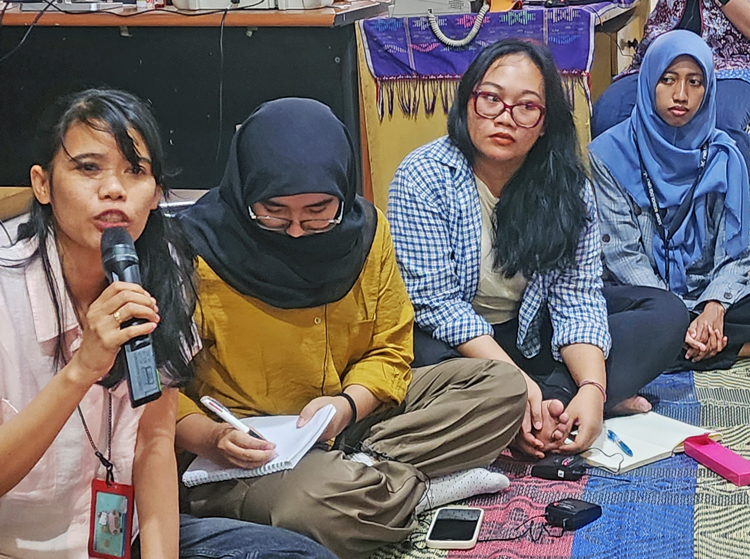JAKARTA, Indonesia — Supporters of women’s rights joined a mass labor rally here Oct. 24 protesting new anti-labor measures in a law adopted by the government. Some of its measures hit women especially hard, including extending the maximum overtime hours to four hours a day and 18 hours a week and removing the right for workers to have two days off a week. These make it even more difficult for women to spend time with their families.
The law also makes it easier for employers to hire workers on temporary contracts. Contract workers can be paid by piece rate rather than an hourly wage, and don’t receive the same benefits as permanent workers. And the law makes it more difficult to get severance pay if you’re laid off.
Tens of thousands of workers, the large majority women, have lost jobs in the garment and textile industry over the last year. Indonesia was the eighth-largest exporter of clothing worldwide in 2021, but the industry has been in decline, with major textile factories shutting down.
Some 85% of all textile workers are employed in Java, Indonesia’s most populous island, outside this city, where the minimum wage is much lower than here.
These Militant correspondents took part in a meeting here Nov. 11 with representatives from Perempuan Mahardhika, which organizes women workers, and Jala PRT from the National Advocacy Network for Domestic Workers. The meeting was held at the offices of Yayasan Kalyanamitra, a women’s rights organization.
Vivi Widyawati explained that Perempuan Mahardhika works with women garment workers, both in small shops and in factories, which are 80% to 90% female.
Low wages and discrimination and harassment are widespread in the garment factories, which subcontract out work. “Many workers are on short-term contracts, in some cases for only two weeks,” Widyawati said. “That makes it harder for workers to join a union.”
Millions more Indonesian women and girls work in private households as domestic workers and in the broader “informal economy” of workers who have no contract — the majority of all jobs in Indonesia. As a result, they don’t even have the limited protections in Indonesian labor laws.
Jala PRT has been fighting for years for a domestic workers’ protection bill, first submitted in 2004, to be passed by the Indonesian parliament.
Lita Anggraini, national coordinator of Jala PRT, called on Prabowo Subianto, Indonesia’s new president, to get parliament to pass the bill. “Domestic workers are workers. They provide essential services,” she said. “But domestic workers are denied access and claim to basic rights and protection. They face some of the harshest working conditions.”
The fight for women’s rights
Yayasan Kalyanamitra was founded in 1985 under the Suharto regime to “fight against injustice and the oppression of women.” One of its campaigns today is to end child marriage.
It has been working with groups in villages in rural western Java where contract marriages of underage girls continue to take place. Villagers are promised money for their family for allowing their daughters to marry foreigners.
Young girls “don’t have the power to say no,” Rena Herdiyani, a longtime leader of Kalyanamitra, explained. “They have to quit school and they lose access to education.” Also, she said, they face a higher mortality rate, with a greater risk of dying from having a child too young. “It is another way in which women are exploited.”
In an advance, Indonesia’s revised marital law raises the minimum age for marriage to 19. “But there is a loophole,” Herdiyani said, that allows “dispensation from religious courts for child marriage.
Kalyanamitra has a number of students working with it. “We are dealing with a new generation,” Lilis Listyowati said. “Young women are targeted by capitalism” over social media and in other ways.
Those participants in the meeting were interested in the new edition of the Pathfinder book Cosmetics, Fashion, and the Exploitation of Women, including in translating it into Indonesian. As the book’s new preface explains, it is about how the universal second-class status of women in class-divided society emerged in humankind’s past and how it continues to flourish today under capitalism. And in how it can be ended.


